tIcf Kkäv - Academics India
tIcf Kkäv - Academics India
tIcf Kkäv - Academics India
You also want an ePaper? Increase the reach of your titles
YUMPU automatically turns print PDFs into web optimized ePapers that Google loves.
©<br />
Government of Kerala<br />
<strong>tIcf</strong> kÀ¡mÀ<br />
2006<br />
Reg. No cPn. \¼À<br />
KL/TV (N)/12/2006-2008<br />
KERALA GAZETTE<br />
<strong>tIcf</strong> Kkäv<br />
EXTRAORDINARY<br />
Akm[mcWw<br />
PUBLISHED BY AUTHORITY<br />
B[nImcnIambn {]kn²s¸Sp¯pXv<br />
Vol. XLVII<br />
hmeyw 51<br />
Thiruvananthapuram,<br />
Monday<br />
Xncph\´]pcw,<br />
Xn¦Ä<br />
19 th June 2006<br />
2006 Pq¬ 19<br />
29 th Jyaishta 1928<br />
1928 tPyj vTw 29<br />
No.<br />
\¼À<br />
1030<br />
SECRETARIAT OF THE KERALA LEGISLATURE<br />
NOTIFICATION<br />
No. 1138/Legn.1/2006/Leg. Dated, Thiruvananthapuram, 19 th June, 2006<br />
The Kerala Professional Colleges (Prohibition of Capitation Fee, Regulation of<br />
Admission, Fixation of Non Exploitative Fee, and Other Measures to Ensure Equity and<br />
Excellence in Professional Education) Bill, 2006 together with the Statement of Objects<br />
and Reasons, the Financial Memorandum and the Memorandum Regarding Delegated<br />
Legislation is published, under Rule 69 of the Rules of Procedure and Conduct of<br />
Business in the Kerala Legislative Assembly.<br />
DR. M.C. VALSON,<br />
Secretary,<br />
Legislative Assembly
2<br />
Twelfth Kerala Legislative Assembly<br />
Bill No.4<br />
THE KERALA PROFESSIONAL COLLEGES (PROHIBITION OF CAPITATION<br />
FEE, REGULATION OF ADMISSION, FIXATION OF NON EXPLOITATIVE FEE<br />
AND OTHER MEASURES TO ENSURE EQUITY AND EXCELLENCE IN<br />
PROFESSIONAL EDUCATION) BILL, 2006<br />
A<br />
BILL<br />
to provide for prohibition of capitation fee, regulation of admission, fixation of non<br />
exploitative fee, reservation of seats to Scheduled Castes, Scheduled Tribes and other<br />
socially and economically backward classes and other measures to ensure equity and<br />
excellence in professional colleges and for matters connected therewith or incidental<br />
thereto:<br />
Preamble – WHEREAS, the Hon’ble Supreme Court has held that where there is<br />
more than one minority or non-minority institution or similarly situated institution in the<br />
State imparting education in any one discipline, then a single common entrance test<br />
followed by centralized counseling or in otherwords single window system of admission<br />
is necessary in order to achieve the twin objectives of transparency and merit and further<br />
has held that the State can take over the admission procedure to ensure that it is fair,<br />
transparent and non-exploitative;<br />
AND WHEREAS, it is considered that in the light of the past experiences of maladministration<br />
of entrance test held by the Consortium of Private Professional Colleges in<br />
the State, all institutions of the same or similar type, whether minority or non-minority<br />
shall be required to fill their seats on the basis of merit determined through a single<br />
common entrance test followed by centralized counseling administered by the State<br />
Commissioner for Entrance Examinations;<br />
AND WHEREAS, in the Constitution (Ninety-third Amendment) Act, 2005, a<br />
provision has been made under article 15 (5) as follows: -<br />
“(5) Nothing in this article or in sub-clause (g) of clause (1) of article 19 shall<br />
prevent the State from making any special provision, by law, for the advancement of any<br />
socially and educationally backward classes of citizens or for the Scheduled Castes or the<br />
Scheduled Tribes in so far as such special provisions …. to their admission to educational<br />
institutions including private educational institutions whether aided of unaided by the<br />
State, other than the minority educational institutions referred to clause (1) of article 30”;<br />
AND WHEREAS, it is necessary to provide freeship and scholarship to a large<br />
number of economically weaker students to protect and strengthen the State’s long<br />
tradition of providing equitable opportunities for education at all levels of learning, and to
3<br />
promote social justice in accordance with the directive principles of the Constitution, it is<br />
necessary to apply the principle of using the excess funds generated from NRI seats for<br />
benefiting students such as students from economically weaker sections of society as<br />
enunciated in the Supreme Court as one of the considerations for the fixation of fee by<br />
the competent authority appointed for the purpose and to set up a Higher Education<br />
Scholarship Fund for providing scholarship to the socially and economically weaker<br />
students;<br />
BE it enacted in the Fifty-Seventh Year of the Republic of <strong>India</strong> as follows: -<br />
1. Short title and commencement – (1) This Act may be called the Kerala<br />
Professional Colleges (Prohibition of Capitation Fee, Regulation of Admission, Fixation<br />
of Non-Exploitative Fee and Other Measures to Ensure Equity and Excellence in<br />
Professional Education) Act, 2006.<br />
(2) It shall come into force at once.<br />
2. Definitions – In this Act, unless the context otherwise requires -<br />
(a) Admission Supervisory Committee means the committee constituted under<br />
section 4 for regulating admission in unaided professional colleges;<br />
(b) ‘Aided College’ means a professional colleges receiving financial aid or grant-inaid<br />
from any State or Central Government and includes minority and nonminority<br />
professional college;<br />
(c) ‘Capitation Fee’ means any amount by whatever name called whether in cash or<br />
in kind paid or collected or received directly or indirectly in addition to the fees<br />
determined under this Act;<br />
(d) ‘Common Entrance Test’ means the entrance test conducted for determination of<br />
merit of the candidates followed by centralized counselling for the purpose of<br />
admission to professional colleges through a single window procedure by the<br />
State Commissioner for Entrance Examinations;<br />
(e) ‘Fee’ means all fees including tuition fee, development fee and an other fee fixed<br />
by the Fee Regulatory Committee;<br />
(f) ‘Fee Regulatory Committee’ means the Committee constituted under section 6 for<br />
determining the fee for admission to unaided professional colleges;<br />
(g) ‘Freeship’ means full or partial remission of tuition fee awarded to Scheduled<br />
Caste and Scheduled Tribe and other socially, educationally and economically<br />
backward students on merit-cum-means principle;
4<br />
(h) ‘general merit seats’ means seats other than reservation seats, minority seats and<br />
NRI seats and notified as such by Government or any agency authorised by it;<br />
(i) ‘Government’ means the Government of Kerala;<br />
(j) ‘Higher Education Scholarship Fund’ means the fund for providing freeship and<br />
scholarship to economically backward students on merit cum means basis;<br />
(k) ‘management’ means any person or body by whatever name called, under whose<br />
administration any unaided professional college is functioning;<br />
(l) ‘minority’ for the purpose of this Act means a community belonging to a religious<br />
or linguistic minority as may be notified by Government taking the State as a unit;<br />
(m) ‘minority professional college’ means a professional college established and<br />
maintained by a minority that fulfills the non-discriminatory criteria prescribed by<br />
Government taking the State as a unit and declared as such by the Government;<br />
(n) ‘minority seats’ means seats reserved for students who belong to the community<br />
that runs the minority unaided professional college and filled up on the basis of<br />
interse merit from the rank list prepared by the Commissioner for Entrance<br />
Examinations;<br />
(o) ‘Non-Resident <strong>India</strong>n seats’ means seats reserved for children or wards or<br />
dependants of Non-Resident <strong>India</strong>ns to whom admission is given by the<br />
management in a far, transparent and non-exploitative manner on the basis of fees<br />
prescribed;<br />
(p) ‘prescribed’ means prescribed by rules made under this Act;<br />
(q) ‘professional college’ means a college aided or unaided imparting professional<br />
courses in any of the following disciplines, namely:-<br />
(a) Engineering and Technology;<br />
(b) Medicine, Dentistry, Pharmacy, Ayurveda, Homoeopathy, Siddha and<br />
Nursing;<br />
(c) Any other discipline as may be declared by the Government by<br />
notification in the Gazette;<br />
(r) ‘qualifying examination’ means the examination as may be prescribed as<br />
qualifying for the purpose of appearing for the Common Entrance Test;<br />
(s) ‘reservation seats’ means seats reserved as such under section 9 of the Act;
5<br />
(t) ‘single window system’ means the centralized system for admission administered<br />
by the State Commissioner for Entrance Examinations to professional courses in<br />
both aided and unaided, minority and non-minority colleges;<br />
(u) ‘State’ means the State of Kerala;<br />
(v) ‘unaided professional college’ means professional college which is not receiving<br />
aid or grant-in-aid from any State or Central Government;<br />
(w) ‘University’ means a University established under any law made by the<br />
Legislature of the State.<br />
3. Method of admission in Professional Colleges – Notwithstanding anything<br />
contained in any other law for the time being in force or in any judgement, decree or<br />
order of any Court or any other authority, admission of students in all professional<br />
colleges shall be made through Common Entrance. Test conducted by the State followed<br />
by centralized counselling through a single window system in accordance with such<br />
procedure as may be specified.<br />
4. Admission Supervisory Committee – (1) The Government shall constitute an<br />
Admission Supervisory Committee to supervise and guide the process of admission of<br />
students to unaided professional colleges consisting of the following members, namely: -<br />
(i)<br />
(ii)<br />
(iii)<br />
A retired Judge of the Supreme Court or a<br />
High Court<br />
The Secretary to Government.<br />
Higher Education Department (ex-officio)<br />
The Secretary to Government, Health &<br />
Family Welfare Department (ex-officio)<br />
(iv) The Secretary to Government, Law<br />
Department (ex-officio)<br />
(v) The Commissioner for Entrance<br />
Examinations, Kerala (ex-officio)<br />
(vi)<br />
An Educational Expert belonging to the<br />
Scheduled Caste or Scheduled Tribe<br />
Community<br />
- Chairperson<br />
- Member Secretary<br />
- Member<br />
- Member<br />
- Member<br />
- Member<br />
(2) The Admission Supervisory Committee may adopt its own procedure for the<br />
conduct of its business.<br />
(3) The terms and conditions of service of the Chairperson and the members of<br />
the Admission Supervisory Committee shall be as may be prescribed.
6<br />
(4) The Admission Supervisory Committee shall supervise and guide the entire<br />
process of admission of students to the unaided professional colleges with a view to<br />
ensure that the process is fair, transparent, merit-based and non-exploitative under the<br />
provisions of this Act.<br />
(5) The Admission Supervisory Committee may hear complaints with regard to<br />
admission in contravention of the provisions contained herein. If the Admission<br />
Supervisory Committee after enquiry finds that there has been any violation of the<br />
provisions for admission on the part of the unaided professional colleges, if shall make<br />
appropriate recommendation to the Government and the Government may direct the<br />
concerned University to levy and collect a fine upto rupees ten lakhs in case of each such<br />
violation or any other course of action as it deems fit. It shall be lawful for the University<br />
to levy such fine. The Admission Supervisory Committee may also declare admission to<br />
be de-hors merit and therefore invalid and in such case the concerned University shall not<br />
permit such candidates to appear for the examination. The University shall not approve<br />
all or any or the admissions made to such colleges in violation of the provisions of this<br />
Act.<br />
(6) The Admission Supervisory Committee may if satisfied that any unaided<br />
professional college has violated any of the provisions of this Act, recommend to the<br />
University or Statutory Body for withdrawal of the affiliation or recognition of such<br />
college or any other course of action it deems fit.<br />
5. Collection of capitation fee prohibited – (1) No capitation fee shall he collected<br />
by or on behalf of an unaided professional college or by any person who is in charge of or<br />
is responsible for the management of such college from or in relation to any candidate in<br />
consideration of his admission to or continuance of any course of study or his promotion<br />
to a higher class in such college or an institution under the management.<br />
(2) Where the Admission Supervisory Committee on receipt of any complaint or<br />
is otherwise satisfied that the management of an unaided professional college or any<br />
person who is in charge of it or is responsible for the management of such college has<br />
violated the provisions of sub-section (1), the Admission Supervisory Committee may<br />
after due enquiry recommend to the Government for taking penal action against the<br />
management.<br />
(3) The Admission Supervisory Committee shall have the power to regulate its<br />
own procedure in all matters arising out of the discharge of its functions, and shall, for<br />
the purpose of making any enquiry under this Act, have all the powers of a Civil Court<br />
under the Code of Civil Procedure, 1908 (Central Act 5 of 1908) white trying a suit in<br />
respect of the following matters, namely: -<br />
(a) summoning and enforcing the attendance of any witness and examining him<br />
on oath;<br />
(b) requiring the discovery and production of any document;<br />
(c) receiving evidence on affidavit; and
7<br />
(d) issuing commissions for the examinations of witnesses and for local<br />
inspections.<br />
and any proceeding before such committee shall be deemed to be a judicial proceeding<br />
within the meaning of section 193 and 228 and for the purposes of section 196 of the<br />
<strong>India</strong>n Penal Code (Central Act 45 of 1860).<br />
6. Fee Regulatory Committee – (1) The Government shall constitute a Committee<br />
called the Fee Regulatory Committee for determination of the fee for admission to the<br />
unaided professional colleges consisting of the following members, namely: -<br />
(i)<br />
(ii)<br />
(iii)<br />
(iv)<br />
(v)<br />
A retired Judge of the Supreme Court or<br />
High Court<br />
The Secretary to Government either in<br />
charge of Medical or Higher Education,<br />
as the case may be, depending on the<br />
course of study<br />
A Chartered Accountant nominated by the<br />
Government in consultation with the<br />
Chairperson<br />
A representative of either the Medical<br />
Council of <strong>India</strong> or the All <strong>India</strong> Council<br />
for Technical Education, as the case may<br />
be, depending on the course of study<br />
An Educational Expert nominated by the<br />
Government in consultant with the<br />
Chairperson<br />
- Chairperson<br />
- Member Secretary<br />
- Member<br />
- Member<br />
- Member<br />
(2) The Fee Regulatory Committee shall adopt its own procedure for the conduct<br />
of its business.<br />
(3) The terms and conditions of service of the Chairperson and other Members of<br />
the Fee Regulatory Committee shall be as may be prescribed.<br />
(4) The Fee Regulatory Committee shall have power to-<br />
(a) require each unaided professional college to place before the Committee the<br />
proposed fee structure of such college with all relevant documents and books of<br />
accounts for scrutiny well in advance of the commencement of the academic year<br />
i.e not later than 31 st December of the previous academic year;<br />
(b) verify whether the fee proposed by each college is justified and it does not amount<br />
to profiteering or charging of capitation fee;
8<br />
(c) approve the fee structure or determine some other fee which can be charged by<br />
the college.<br />
(5) The fee determined by the Committee shall be binding on the unaided<br />
professional college for a period of three years. The fee so determined shall be applicable<br />
to a candidate who is admitted to a college in that academic year and shall not be revised<br />
till the completion of his course in the said college. No unaided professional college shall<br />
collect a fee amounting to more than one year’s fee from a candidate. Collecting of more<br />
than one year’s fee shall be construed as collecting of capitation fee and shall be liable to<br />
be proceeded against.<br />
(6) No person who is associated to any unaided professional college shall be<br />
eligible for being a member of the Fee Regulatory Committee.<br />
(7) A member of the Fee Regulatory Committee shall cease to be so if he<br />
performs any act, which in the opinion of the Government, is unbecoming of a member<br />
of the Committee.<br />
Provided that no such member shall be removed from the Committee without<br />
giving him an opportunity of being heard.<br />
(8) The Fee Regulatory Committee shall have the power to regulate its own<br />
procedure in all matters arising out of the discharge of its functions, and shall, for the<br />
purpose of making any enquiry under this Act, have all the powers of a Civil Court under<br />
the Code of Civil Procedure, 1908 (Central Act 5 of 1908) while trying a suit in respect<br />
of the following matters, namely: -<br />
(a) summoning and enforcing the attendance of any witness and examining him on<br />
oath;<br />
(b) requiring the discovery and production of any document;<br />
(c) receiving evidence on affidavit; and<br />
(d) issuing commissions for the examination of witness and for local inspections<br />
and any proceeding before such Committee shall be deemed to be a judicial proceeding<br />
within the meaning of sections 193 and 228 and for the purpose of section 196 of the<br />
<strong>India</strong>n Penal Code (Central Act 45 of 1860).<br />
7. Factors for determination of fee – The Fee Regulatory Committee shall<br />
determine the fee or fees to be charged by an unaided professional college taking into<br />
consideration the factors, such as;<br />
(a) the obligation on the part of all unaided professional colleges to provide freeship<br />
to students admitted under section 9;
9<br />
(b) the location of the unaided professional college;<br />
(c) the nature of the professional course;<br />
(d) the available infrastructure;<br />
(e) the expenditure on administration and maintenance;<br />
(f) a reasonable surplus required for the growth and development of the college;<br />
(g) the additional expenses over and above the excess funds generated from Non-<br />
Resident <strong>India</strong>n and charity on the part of managements required for providing<br />
freeship to the students in the reservation category under section 9;<br />
(h) any other factor as the Committee may deem fit.<br />
8. Fees not to be collected excessively – (1) No unaided professional college shall<br />
collect any fee by whatever name called from the candidate for admission over and above<br />
the fee determined by the Fee Regulatory Committee and the fee prescribed by the<br />
University concerned.<br />
Provided that the Fee Regulatory Committee shall fix the fee for Non-Resident<br />
<strong>India</strong>n seats and the amount so collected over and above the fee determined for other<br />
students in the College shall be utilized for providing freeship and scholarship to<br />
economically backward students.<br />
(2) Notwithstanding anything contained in any other provisions of the Act, the<br />
fixation and levy of fees at the rates fixed by the Committee constituted before the date of<br />
coming into force of this Act shall be deemed to be validly fixed and collected.<br />
9. Reservation of seats – (1) In every professional college other than a minority<br />
college -<br />
(a) ten per cent of the total number of sanctioned seats shall be earmarked for the<br />
Scheduled Castes and Scheduled Tribes;<br />
(b) twenty five per cent to the Other Socially and Educationally Backward Classes in<br />
such manner as may be prescribed;<br />
(c) three per cent of the total number of sanctioned seats shall be earmarked for<br />
physically challenged persons as prescribed; and<br />
(d) twelve per cent of the total number of sanctioned seats shall be earmarked for the<br />
other class of weaker sections of society not otherwise covered:
10<br />
Provided that in an unaided professional college the provision in clauses (c) and<br />
(d) shall apply in accordance with the consensus based on mutual agreement arrived at<br />
between the unaided professional college and the Government and following such<br />
principles and in such manner as may be prescribed:<br />
Provided further that the admissions contemplated in clauses (b), (c) and (d)<br />
above shall be in compliance with the rules as may be prescribed.<br />
(2) In an unaided professional college belonging to both minority and nonminority,<br />
upto fifteen per cent of the total number of sanctioned seats may be filled by<br />
candidates under the category of Non-Resident <strong>India</strong>n seats.<br />
(3) Where the seats reserved for the Scheduled Castes/Scheduled Tribes and other<br />
Socially and Educationally Backward Classes are left unfilled due to non-availability of<br />
the candidates, or where students of reserved categories leave after they select the seats,<br />
the same shall be filled by the candidates belonging to the same category out of the merit<br />
list of the Common Entrance Test. In the absence of candidates from the same category,<br />
the seats shall be filled up from the general merit. Seats not filled up under Non-Resident<br />
<strong>India</strong>n seats shall be filled up from the general merit seats.<br />
(4) Minority unaided professional college shall admit not less than fifty per cent<br />
of the students from the community that runs the colleges on the basis of inter se merit<br />
from the rank list prepared by the Commissioner for Entrance Examinations and may<br />
surrender up to thirty five per cent of the seats to be filled up by the Commissioner for<br />
Entrance Examinations from the Reservation or General merit seats. Any seat not so<br />
surrendered shall also be treated as minority seats and filled up in the manner as may be<br />
prescribed.<br />
10. Invalidation of admissions – Any admission made in violation of the provisions of<br />
this Act or the rules made thereunder shall be invalid.<br />
11. Higher Education Scholarship Fund – (1) The Government may by notification in<br />
the Gazette constitute a Fund called the Higher Education Scholarship Fund for providing<br />
scholarship to socially and economically backward students admitted in professional<br />
colleges on merit cum means basis.<br />
(2) The corpus of the fund shall be the contribution from the Government, the<br />
amount of fine levied under this Act and the funds raised from any other source including<br />
Non-Resident <strong>India</strong>ns.<br />
(3) The fund shall be administered by an Administrator appointed by the<br />
Government. The administration of the fund including the corpus shall be in such manner<br />
as may be prescribed.<br />
(4) The accounts of the Fund shall be audited annually by the Accountant<br />
General.
11<br />
(5) The Administrator shall before such date, in such form and at such interval as<br />
may be prescribed submit a report to the Government and the Government shall cause a<br />
copy of such report to be laid before the Legislative Assembly.<br />
12. Protection of action taken in good faith – No suit, prosecution of other legal<br />
proceedings shall lie against any member of the Admission Supervisory Committee or<br />
Fees Regulatory Committee or any other officer of the Government for anything which is<br />
done in good faith or intended to be done in good faith under this Act.<br />
13. Power of the Government to issue directions – (1) The Government may give<br />
such directions to any professional college as in its opinion are necessary or expedient for<br />
carrying out the purposes of this Act or give effect to any of the provisions contained<br />
therein or in any rules or orders made thereunder and the management of the college shall<br />
comply with every such direction.<br />
(2) The Government may also give such directions to the officers or authorities<br />
under its control which in its opinion are necessary or expedient for carrying out the<br />
purposes of this Act.<br />
14. Penalties – (1) Whoever contravenes the provisions of this Act or the rules made<br />
thereunder shall, on conviction be punishable with imprisonment for a term which shall<br />
not be less than one year but which may extend to three years and with fine which shall<br />
not be less than rupees fifty lakhs.<br />
(2) A penalty under this section may be imposed without prejudice to the penalty<br />
specified in any other Act.<br />
15. Cognizance of offence – No court shall take cognizance of any offence punishable<br />
under this Act except on a report in writing of the facts constituting such offence made by<br />
an officer authorized by the Government in this behalf by notification published in the<br />
Gazette.<br />
16. Power to remove difficulties – (1) If any difficulty arises in giving effect to the<br />
provisions of this Act, the Government may, by order, as occasion requires, but not later<br />
than two years from the date of commencement of this Act, do anything not inconsistent<br />
with the provisions of this Act which appears to them necessary for removing the<br />
difficulty.<br />
(2) Every order issued under sub-section (1) shall be laid, as soon as may be after<br />
it is issued, before the Legislative Assembly.<br />
17. Power to made rules – (1) The Government may, by notification in the Gazette,<br />
make rules for the purpose of carrying into effect the provisions of this Act.<br />
(2) Every rule made under this section shall be laid, as soon as may be after it is<br />
made, before the Legislative Assembly while it is in session for a total period of fourteen
12<br />
days which may be comprised in one session or in two successive sessions and if before<br />
the expiry of the session in which it is so laid or the session immediately following the<br />
Legislative Assembly makes any modification to the rule or decides that the rule should<br />
not be made, the rule shall thereafter have effect only in such modified form or be of no<br />
effect, as the case may be, so however, that any such modification or annulment shall be<br />
without prejudice to the validity of anything previously done under that rule.<br />
18. Repeal – The Kerala Self-Financing Professional Colleges (Prohibition of<br />
Capitation Fees and Procedure for Admission and Fixation of Fees) Act, 2004 (17 of<br />
2004) is hereby repealed.<br />
STATEMENT OF OBJECTS AND REASONS<br />
The Hon’ble Supreme Court in its judgment in P.A. Inamdar and others Vs State<br />
of Maharashra has held that the State Government in the absence of a Central<br />
Legislation, can come out with a detailed well through out legislation for ensuring fair,<br />
transparent and non-exploitative procedure for admission to ensure merit based admission<br />
in unaided professional colleges. The 93 rd Constitutional amendment has empowered the<br />
State Legislatures to reserves seats in unaided professional institutions for socially and<br />
educationally backward classes of citizens and for the Scheduled Castes and the<br />
Scheduled Tribes. The policy of the State is to protect and strengthen its long tradition of<br />
providing equitable opportunities for education at all levels by providing freeship<br />
scholarship to socially and economically backward classes of students. Providing greater<br />
access to professional education would enhance national wealth, more so in the emerging<br />
Knowledge Economy. The State on its own does not have the resources to provide free<br />
education to all meritorious students belonging to the socially and economically weaker<br />
sections who want to pursue in professional education. The State has therefore decided to<br />
check the commercialization of professional education and to promote charitable<br />
investment in the unaided professional education sector.<br />
2. The Bill is intended to achieve the above<br />
FINANCIAL MEMORANDUM<br />
Clause 4 of the Bill empowers Government to constitute an Admission<br />
Supervisory Committee to supervise and guide the process of admission of students to<br />
unaided professional colleges. There will be additional expenditure both recurring and<br />
non-recurring towards the remuneration of Chairperson, establishment of office of the<br />
Committee, and payment of DA and TA of the members of the Committee. An amount of<br />
rupees fifteen lakhs is anticipated in the first year and an annual recurring expenditure of<br />
approximately rupees twenty lakhs.<br />
Clause 6 of the Bill empowers Government to constitute a Fee Regulatory<br />
Committee for determination of the fee for admission to unaided professional colleges.<br />
There will be additional expenditure both recurring and non-recurring towards the
13<br />
expenditure of the Committee. It is expected that there will be initial non-recurring<br />
expenditure to the tune of rupees fifteen lakhs is anticipated in the first year and an<br />
annual recurring expenditure of approximately rupees twenty lakhs.<br />
MEMORANDUM REGARDING DELEGATED LEGISLATION<br />
Sub-clause (h) of clause 2 of the Bill seeks to empower the Government or any<br />
agency authorized by it to notify the general merit seats. Sub-clause (1) of the said clause<br />
of the Bill seeks to empower the Government to notify the Community as minority for<br />
the purpose of this Act taking the State as a unit. Sub-clause (m) of the said clause of the<br />
Bill seeks to empower the Government to prescribe the non-discriminatory criteria to be<br />
fulfilled by a minority professional college and to declare it as a minority professional<br />
college.<br />
2. Item (c) of sub-clause (q) of clause 2 of the Bill seeks to empower the<br />
Government to declare a professional college of any other discipline by notification in the<br />
Gazette.<br />
3. Sub-clause (r) of clause 2 of the Bill seeks to empower the Government to<br />
prescribe the examination as a qualifying examination for the purpose of appearing for<br />
the Common Entrance Test.<br />
4. Clause 3 of the Bill seeks to empower the Government to specify the procedure<br />
for admission of students in all professional colleges through common entrance test<br />
conducted by the State followed by centralized counselling through a single window.<br />
5. Sub-clause (1) of clause 4 of the Bill seeks to empower the Government to<br />
constitute an Admission Supervisory Committee to supervise and guide the process of<br />
admission of students of unaided professional colleges. Sub-clause (3) of the said clause<br />
of the Bill seeks to empower the Government to prescribe the terms and conditions fo<br />
service of the Chairperson and the members of the Admission Supervisory Committee.<br />
6. Sub-clause (1) of clause 6 of the Bill seeks to empower the Government to<br />
Constitute a Fee Regulatory Committee for determination of fee for admission to the<br />
unaided professional colleges. Sub-clause (3) of the said clause of the Bill seeks to<br />
empower the Government to prescribe the terms and conditions of service of the<br />
Chairperson and other members of the Fee Regulatory Committee.<br />
7. Sub-clause (1) of clause 9 of the Bill seeks to empower the Government to<br />
prescribe the manner for reservation of seats for Scheduled Castes and Scheduled Tribes<br />
and Other Socially and Educationally Backward Classes and Physically Challenged<br />
persons and other class of weaker sections of society not otherwise covered. The proviso<br />
to sub-clause (1) empower the Government to prescribe the principles and manners of<br />
reservation seats in clause (c) and (d) of sub-clause (1) Sub-clause (4) of the said clause<br />
of the Bill seeks to empower the Government to prescribe the manner of filling the seats
14<br />
not surrendered by the minority unaided professional college treating them as minority<br />
seats.<br />
8. Sub-clause (1) of clause 11 of the Bill seeks to empower the Government to<br />
constitute the Higher Education Scholarship Fund, by notification in the Gazette. Subclause<br />
(3) of the said clause of the Bill seeks to empower the Government to prescribe the<br />
manner of the administration of the said fund. Sub-clause (5) of the said clause of the Bill<br />
seeks to empower the Government to prescribe the date, form and interval to submit a<br />
report by the Administrator.<br />
9. Sub-clause (1) of clause 13 of the Bill seeks to empower the Government to give<br />
directions to the professional colleges for carrying out the purpose of the Act. Sub-clause<br />
(2) of the said clause of the Bill seeks to empower the Government to give directions to<br />
the officers or authorities for carrying out the purpose of the Act.<br />
10. Sub-clause (1) of clause 16 of the Bill seeks to empower the Government by<br />
order, to do anything not inconsistent with the Act to remove any difficulty that may arise<br />
in giving effect to the provisions of the Act.<br />
11. Sub-clause (1) of clause 17 of the Bill seeks to empower the Government to make<br />
rules for the purpose of carrying into effect the provisions of the Act.<br />
12. The matters in respect of which notifications may be issued or rules may be made<br />
are matters of procedure and are routine or administrative in nature. Further the rules,<br />
after they are made, are subject to scrutiny by the Legislative Assembly. The delegation<br />
of the legislative power is, thus, of a normal character.<br />
M. A. BABY


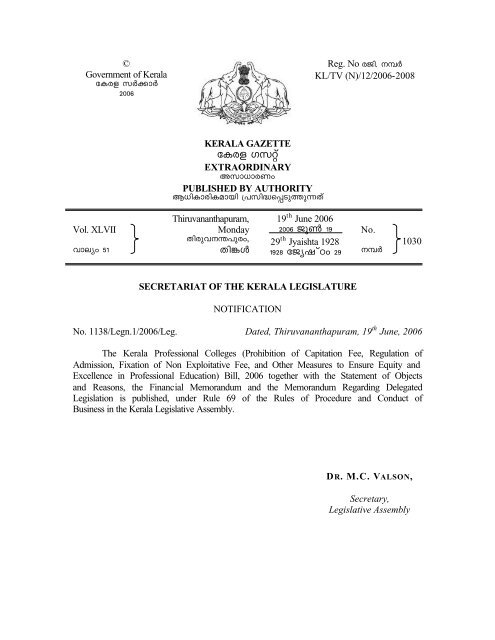
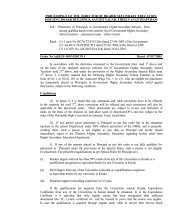
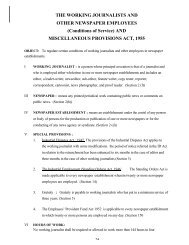
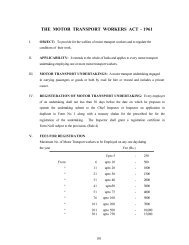
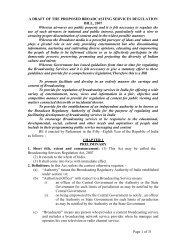
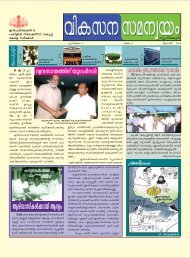
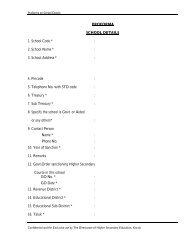
![DÆt]-Pp-I-fn¬ - Old.kerala.gov.in - Government of Kerala](https://img.yumpu.com/24938081/1/190x245/daet-pp-i-fna-oldkeralagovin-government-of-kerala.jpg?quality=85)
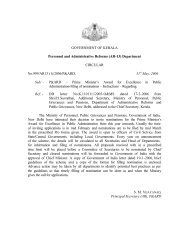
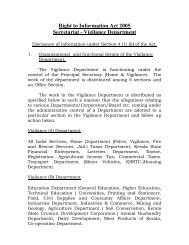
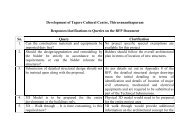
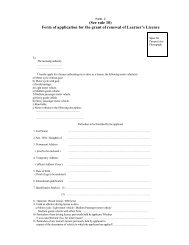
![sF.-Sn.-bn-eqsS ka{K ]ptcm-K-Xn-bn-te°v](https://img.yumpu.com/24938067/1/190x245/sf-sn-bn-eqss-kak-ptcm-k-xn-bn-teav.jpg?quality=85)
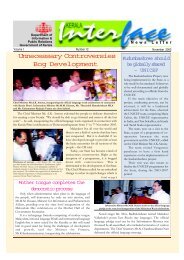
![{]th-i-t\m-'hw tIaw - Old.kerala.gov.in - Government of Kerala](https://img.yumpu.com/24938061/1/184x260/th-i-tm-hw-tiaw-oldkeralagovin-government-of-kerala.jpg?quality=85)